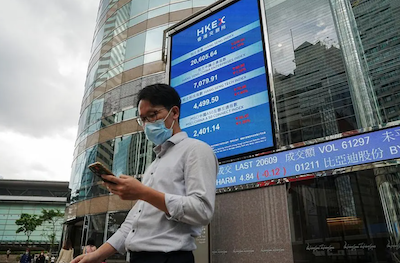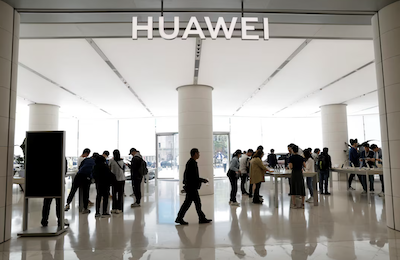Asia’s major stock indexes began the week in the red with investors keeping their powder dry ahead of the release of key US inflation data and amid turbulence in the currency markets.
Traders are worried US prices could derail the outlook for lower interest rates, while bets on currency intervention from Japan stalled the yen’s decline for the moment and the yuan rebounded, propped up by suspected selling of dollars by state-owned banks.
Japan’s Nikkei share average closed lower as the profit-takers moved in following last week’s central bank decisions, snapping a four-day winning streak.
Also on AF: India Startup Investment Slumps as Paytm, Byju’s Crashes Bite
The Nikkei closed 1.16% lower at 40,414.12, with only 30 of the index’s 225 constituents advancing against 192 decliners. The index crossed the 41,000 level for the first time ever on Friday and had notched a record closing high of 40,888.43. The broader Topix was down 1.26% at 2,777.64.
Chipmaking equipment giant Tokyo Electron fell 1.6% and despite the yen hovering around 151.32 per dollar, shares of Japanese companies with higher overseas sales were also lower.
China and Hong Kong stocks slipped as hopes of more significant intervention by Beijing to prop up the country’s struggling economy continued to fade.
The falls came despite Premier Li Qiang telling an audience of global CEOs and Chinese policymakers on Sunday that China’s inflation rate and the central government’s debt burden are relatively low, leaving room for further macro policy steps.
China’s blue-chip CSI300 index was down 0.54% while the Shanghai Composite Index lost 0.71%, or 21.73 points, to end at 3,026.31. The Shenzhen Composite Index on China’s second exchange slipped 1.86%, or 33.14 points, to 1,749.15. The Hang Seng Index fell 0.16%, or 25.83 points, to 16,473.64.
Elsewhere across the region, in earlier trade, Seoul, Singapore, Taipei, Manila, Jakarta and Bangkok all fell, though there were gains in Sydney and Wellington.
MSCI’s broadest index of Asia-Pacific shares outside Japan was flat, just below eight-month highs.
Markets Easter Close
The main data event of the week will be the US core personal consumption expenditure (PCE) price index on Friday which is seen rising 0.3% in February, keeping the annual pace at 2.8%. Anything higher would be taken as a setback to hopes for a Federal Reserve rate cut in June.
Many markets will close for Easter on Friday, when the PCE data is due for release, so the full reaction will have to wait until next week.
Europe has its own inflation tests with consumer price data out from France, Italy, Belgium and Spain, ahead of the overall EU CPI report on April 3.
Expectations for falling borrowing costs globally has been a boon for equities, with the S&P 500 up almost 10% for the year to date. On Monday, S&P 500 futures and Nasdaq futures were trading little changed.
Eurostoxx 50 futures added 0.1%, while FTSE futures barely budged.
Japan’s Nikkei dipped 0.6%, having spiked 5.6% last week to a fresh all-time peak as the yen weakened.
Dollar Surges Ahead
While the Fed sounded dovish last week, it was hardly alone, with the Swiss central bank (SNB) actually cutting rates while the Bank of England (BoE) and European Central Bank (ECB) left markets looking for easings from June onwards.
Even a shift away from super-easy policies by the Bank of Japan (BOJ) could not dent the dollar, as investors assumed it was not the start of a series of hikes and futures imply a rate of just 20 basis points by year end.
On Monday, the dollar was a shade lower at 151.23 yen, having climbed 1.6% last week to a peak of 151.86. Markets are wary of testing 152.00 as that is a level that has drawn Japanese intervention in the past.
Indeed, Japan’s top currency official on Monday warned the yen’s current weakness did not reflect fundamentals and excessive moves were unwelcome.
The strength of the dollar had taken some shine off gold, though the metal was edging higher again to $2,174 an ounce, after hitting a record peak of $2,217.79 last week.
Oil prices were underpinned by Ukraine’s attacks on Russian refineries, along with data showing a fall in US rig counts. Brent rose 46 cents to $85.89 a barrel, while US crude firmed 48 cents to $81.11 per barrel.
Key figures
Tokyo – Nikkei 225 < DOWN 1.16% at 40,414.12 (close)
Hong Kong – Hang Seng Index < DOWN 0.16% at 16,473.64 (close)
Shanghai – Composite < DOWN 0.71% at 3,026.31 (close)
London – FTSE 100 < DOWN 0.18% at 7,916.47 (0934 GMT)
New York – Dow < DOWN 0.77% at 39,475.90 (Friday close)
- Reuters with additional editing by Sean O’Meara
Read more:
Private Equity Deals in Asia Near The Worst in a Decade
Foreign Firms Will be Treated Same as Locals, China Tells Forum
China Told it Must ‘Reinvent Itself’ to Turn Economy Around
Hang Seng Slips as Stimulus Hopes Fade, Nikkei Hits Record High
























